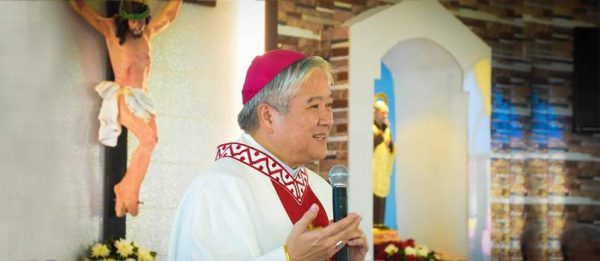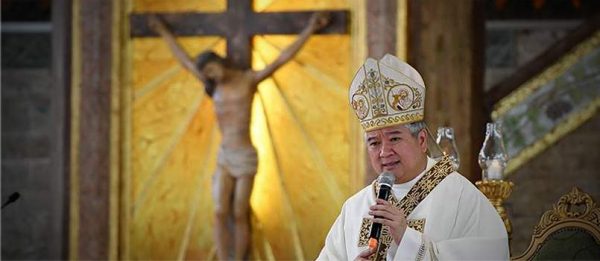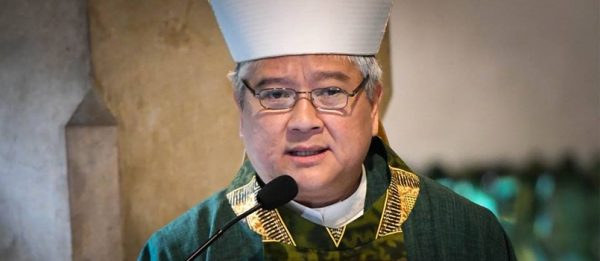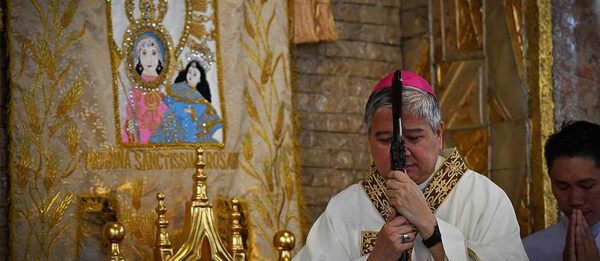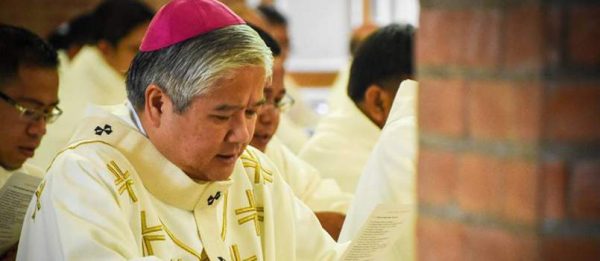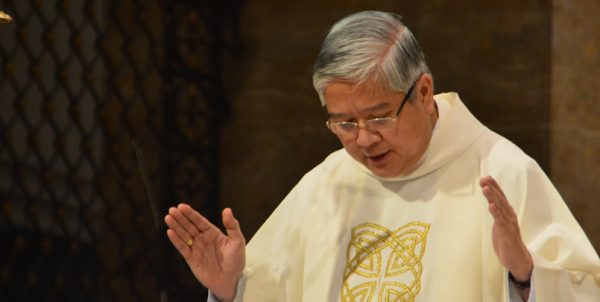234 total views
4th World Apostolic Congress on Mercy
University of Santo Tomas
January 17, 2017
My Sisters and Brothers in the Lord:
It is a great privilege and honor to make this presentation in this 4th World Assembly on Mercy, as it was when I spoke in Rome at WACOM 1.
The topic I shall reflect on is most relevant: Communion in Love and Mercy in Jesus. Let us open our eyes to issues were there is lack of communion:
• various kinds of crimes, terrorism, kidnapping
• drug war, ethnic wars, religious wars
• violation of the rights of the human person to life, to property, to freedom of religion
• degradation of the environment – global warming, climate change
• broken families, poverty, the homeless, street children, slums
• and within the Church:
we are sadly hearing the voices of a vocal minority
They are questioning the vision of our Holy Father, Pope Francis, of a Church of the Poor for the Poor. They are raising doctrinal objections to the Holy Fathers pastoral concern for mercy and compassion for those in great need.
In this social, moral and religious context, it is especially now that the Holy Spirit is urgently calling the whole Church to be a Communion in the Lord Jesus.
But what does this mean? The Church called to be a Communion?
In truth, Vatican II has stated that Communion is the “deepest vocation of the Church” (Lumen Gentium, no. 51).
Communion in Love and Life, Indwelling of the Holy Spirit
Let us begin with the Letters of John and Paul to the early Christian communities.
The first letter of John is a locus classicus for the abiding love of God.
God is love, and those who abide in love abide in God, and God abides in them…. We love because he first loved us…. The commandment we have from him is this: those who love God must love their brothers and sisters also
(1 Jn. 4:16, 19, 21).
How awesome this is! God himself, the Omnipotent and Infinite God, God has a communion of love with us, finite creatures that we are! In love God dwells in us!
The initiative to love begins with God, and God’s love for us impels us to love our neighbor. We are liars if we say we love God but hate our neighbor (see 1 Jn. 4:20).
St. John goes further.
All who obey his commandments abide in him, and he abides in them. And by this we know that he abides in us, by the Spirit that he has given us (1 Jn. 3:24)
By this we know that we abide in him and he in us, because he has given us of his Spirit….God abides in those who confess that Jesus Christ is the Son of God and they abide in God. So we have known and believed the love that God has for us (1 Jn. 4:13-16).
Here we learn from St. John, the beloved disciple, the fundamental dimensions of our communion with God. We have have the deepest communion with God — when we love and obey him, when we have faith in His Son, and when we have the fellowship of the Holy Spirit.
St. Paul also affirm similar truths to the early Christian communities. He emphasizes the indwelling of the Holy Spirit:
But you are not in the flesh, you are in the Spirit since the Spirit of God dwells in you….Christ is in you….If the Spirit of him who raised Jesus from the dead dwells in you, he who raised Christ from the dead will give life to your mortal bodies also through his Spirit that dwells in you (Rom. 8:9-11).
Do you not know that you are God’s temple and that God’s Spirit dwells in you? If anyone destroys God’s temple, God will destroy that person. For God’s temple is holy, and you are that temple (1 Cor. 3:16-17; see also 2 Cor. 6:17).
Living by the Spirit
Similar to John, Paul presents to us the moral consequences of our communion with God in the Holy Spirit:
If we live by the Spirit, let us also be guided by the Spirit
(Gal. 5:26).
Paul guides us on how to live by the Spirit: “Live by the Spirit, I say, and do not gratify the desires of the flesh.” His enumeration of the desires of the flesh ranges from impurities to idolatry , dissensions and factions (see Gal. 5:19-21). On the other hand, Paul teaches us the practical signs and the “fruits” of living by the Spirit: love, joy, peace, patience, kindness, generosity, faithfulness, gentleness, and self-control (Gal. 5:22-23).
If I wish to know how I am living by the Spirit, how I live the life of the Spirit that God has given me, I examine myself: Do I love as I should? Am I patient and joyful? Am I kind and generous? Gentle and faithful? Is my heart at peace? Do I make peace with others?
Christ our Life
This is why St. Paul exhorts and encourages us:
As you therefore have received Christ Jesus the Lord, continue to live your lives in him, rooted and built up in him and established in the faith, just as you were taught, abounding in thanksgiving (Col. 2:6-7).
St. Paul reminds us that Christ is our life (see Col. 3:4). Paul testifies from his own personal experience:
I have been crucified with Christ; and it is no longer I who live, but it is Christ who lives in me. And the life I now live in the flesh I live by faith in the Son of God who loved me and gave himself for me (Gal. 2:19-20).
Two Images of Communion
The Body of Christ – Communion with Christ the Head
For St. Paul the Church’s Communion with Christ reaches its deepest point with his image of the Body of Christ.
Now you are the Body of Christ, and individually members of of it (1 Cor. 12:27)
There is one Body and one Spirit…one Lord, one faith, one Baptism, one God and Father of all, who is above all and through all and in all (Eph. 4:4-6). Speaking of the truth in love, we must grow up in every way into him who is the head, into Christ, from whom the whole body, joined and knitted together by every ligament with which it is equipped, as each part is working properly promotes the body’s growth in building itself up (Eph. 4:15-17).
Communion of Charisms to Build Up the Body
From this image of Christ as head of his body, the Church (see also Col. 1:18, 24; 2:19; 3:15; Rom. 12:5), Paul teaches us of the most intimate union between the Father, the Son, the Holy Spirit and the whole Church. One Spirit, one Lord, one God. Not only is the triune God dwelling in us, the the wonderful reality is that we are the Body of Christ, individually and collectively.
Christ is our Head. We are different parts of the one Body, we have different gifts of the Spirit and play different roles in the body of Christ (1 Cor. 12:4-12, 27-28; Eph. 4:11). The greatest of these gifts is Love (see 1 Cor. 13). Therefore, in love we build up together the whole body (Eph. 4:12, 16). When one suffers, everyone in the body of Christ suffers, if one member is honored, the whole body rejoices (1 Cor. 12:26).
Communion in the Eucharist
It is most eminently in the Holy Eucharist that communion in love is demonstrated:
The cup of blessing that we bless, is it not a sharing in the blood of Christ? The bread that we break, is it not a sharing in the body of Christ? Because there is one bread, we who are many are one body, for we all partake of the one bread (1 Cor. 10:16-17).
For this reason, in the body of Christ there should be no division but only unity and reconciliation There should be no selfishness but only generous sharing, especially with those who have less (1 Cor. 11:17-22).
Communion – the Parable of the Vine and the Branches
In the 15th Chapter of the Gospel according to John, on the eve of His Death, Jesus tells his apostles:
I am the true vine, and my Father is the vine grower…. Abide in me as I abide in you. Just as the branch cannot bear fruit by itself unless it abides in the vine, neither can you unless you abide in me. I am the vine you are the branches. Those who abide in me and I in them bear much fruit, because apart from me you can do nothing (Jn. 15:1, 4-5).
The Lord speaks of the deepest kind of unity between himself and his apostles. He abides in his Apostles, he lives and remains in them. He is in communion with them. How especially true this is for the Apostles. For they had just been given the Lord’s own Body and Blood in the Last Supper. They had become what they had eaten and drunk.
Their communion with the Lord is a communion of Life. The Lord has shared with them his very life. They are branches of the Vine.
Their communion with the Lord is also a Communion of Love. Jesus tells the Apostles:
As the Father has loved me, so I have loved you, abide in my love. If you keep my commandments, you will abide in my love (Jn. 15:9-10).
Jesus cites the very foundation of His love for the Apostles. It is the love of the Father: “As the Father has loved me, so I have loved you, abide in my love.”
The Apostles recall the words that Jesus had earlier said after he had given his own Body and Blood to them: “I give you a new commandment, that you love one another. Just as I have loved you, you also should love one another. By this everyone will know that you are my disciples, if you have love for one another” (Jn. 13:34-35).
This Gospel, this Good News of Communion of Life and Love, of abiding in the Father and in the Son and, surely, through the Holy Spirit, is a message that the Apostles effectively passed on to the early Christian community. Let us see how the early Christians lived a communion of life and love:
All who believed were together and had all things in common; they would sell their possessions and goods and distribute the proceeds to all, as any had need. Day by day, as they spent much time together in the temple, they broke bread at home and ate their food with glad and generous hearts, praising God and having the good will of all the people. And day by day the Lord added to their number those who were being saved (Acts 2:43-47).
How the early Christians loved one another! In praying for one another in the temple, in the “breaking of the bread,” in sharing food and possessions.
And again we this communion of life and love in Chapter 4 of Acts:
Now the whole group of those who believed were of one heart and soul, and no one claimed private ownership of any possessions, but everything they owned was held in common. With great power the apostles gave their testimony to the resurrection of the Lord Jesus and great grace was upon them all. There was not a needy person among them, for as many as owned lands or houses sold them and brought the proceeds of what was sold. They laid it at the apostles’ feet, and it was distributed to each as any had need (Acts 4:32-35).
Indeed a communion of life and love. Unity of heart and soul, sharing possessions with those in need. Is this not part of the vision of our Holy Father, Pope Francis, of a Church of the Poor and for the poor?
Recall your experiences with poor people, the degradation of human beings in slums, of street children begging in the streets, of battered and exploited women, migrants, the list is long and unending.
Today the social teachings of the Church includes doctrine on special love for the poor, “option for the poor,” that private property is given in stewardship by God and has to benefit the poor, that the goods of the whole world are destined for the good of all and not for the good of the few.
The early Christians demonstrated these social doctrines in their communion of life and love. By such love they showed that they were disicples of the Lord. It was a love did not go unnoticed. It attracted others while the Apostles proclaimed that the Lord is risen. Day by day, the number of believers grew (see Acts 2:47).
Reflection in Faith
Communio – the Initiative of God
Reflecting on the data of the New Testament, we come face to face with the overwhelming love and mercy of God. Because Christ loves the Church, he has lifted the Church into communion with the Triune God.
Because Father, Son, and Holy Spirit are in infinite communion of love, so Christ in the Holy Spirit brings us to a communion of love with one another. Trinitarian communion is the basis of the Church’s communion.
The Church is Communion in and through the Paschal Mystery
By its very nature the Church is Communion. By his Passion, Death, and Resurrection, Jesus has formed us into a new creation, alive with the glorious life he shares with the Father and the Spirit. It is God, Father, Son, and Holy Spirit who live in us.
Jesus has totally reconciled us to himself. In so doing he has reconciled us and united us with one another. In this communion of life and love, there is neither Jew or Gentile, no rich or poor, no powerful or powerless.
And if the love of Jesus in His Passion, Death, and Resurrection, reconciled us to God and to one another, the same love reconciled us with the whole of creation. The relationship of of stewardship and harmony is restored.
Communion: a Gift and Task
Communion is first of all God’s gift to us. But it is a gift that also calls us to mission. The Church is called to be what it is – a Communion.
We are called to be communion in love and mercy precisely because our communion with Jesus flows from his love and mercy. We are also called to demonstrate this communion in a mission of love and mercy, in the same manner as Jesus did his own mission.
Ours is the task of building communion among ourselves, laity, clergy and religious alike.
We are not to stop there. We are called to reach out to our neighbors, our parishes and communities, to the wider society, and in love and mercy reconcile broken relationships, bring peace to families and communities broken by crimes and drugs, hostilities and factions, biases and hatred. We are all ambassadors of reconciliation.
Mary, Mother of the Church, Model of Communion
If there is anyone who would personify Communion, it would be our Blessed Mother Mary. She is the Mother of the Church. The Holy Spirit filled her womb with child, conceived without original sin. She was simply full of grace in her Son Jesus. Communion with God in love and obedience. Communion in Love and Life… such was Mary. Mother of the Church, Mother of Love, Mother of Communion.
Conclusion
We commonly observe that when people acknowledge God, they
raise their eyes or point to the skies where presumably heaven is. Thank you, God, they exclaim.
We need to be aware of God’s presence among us. He is not outside of us. We need to be aware of God’s presence in us. God dwells in us. God is knocking on the door of our hearts – from inside.
This is why St. Augustine said, God is nearer to us than we are to ourselves. God is our life. God is in deepest depths of our being. We pray then to God who is not distant from us, not someone up there somewhere in the skies. We pray to God who is within us.
And so we end this reflection with a prayer:
Loving God, you have shared your love and life with us. We praise and thank You. Remain in us, Lord.
You dwell in those who love and obey you. Grant us, O Lord, the grace to live constantly in the Spirit. Remain in us, Lord.
You are the Vine, Lord, we are the branches. Let not anything separate us from you, for separated from you we wither and perish. Remain in us, Lord,
You call us to deeper communion with you through service. May we reach out to our neighbor who is in need and give the joy of the Holy Spirit to those in sorrow, we pray. Remain in us, Lord.
You call us to be ambassadors of communion and reconciliation.
May we go forth to the peripheries, to those living with less hope and less love, to prisoners and drug addicts, to broken families. Remain in us, Lord.
May Mary, the Mother of Love, filled with the Holy Spirit, be ever our companion in our journey to deeper communion with God and with others. This we pray through Christ our Lord.
Amen.
+Orlando B. Cardinal Quevedo, O.M.I.
Archbishop of Cotabato, Philippines











